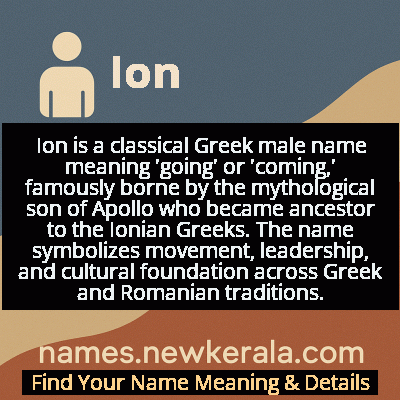Ion Name Meaning & Details
Origin, Popularity, Numerology Analysis & Name Meaning of Ion
Discover the origin, meaning, and cultural significance of the name ION. Delve into its historical roots and explore the lasting impact it has had on communities and traditions.
Name
Ion
Gender
Male
Origin
Greek
Lucky Number
2
Meaning of the Name - Ion
Ion is a classical Greek male name meaning 'going' or 'coming,' famously borne by the mythological son of Apollo who became ancestor to the Ionian Greeks. The name symbolizes movement, leadership, and cultural foundation across Greek and Romanian traditions.
Ion - Complete Numerology Analysis
Your Numerology Number
Based on Pythagorean Numerology System
Ruling Planet
Moon
Positive Nature
Diplomatic, friendly, artistic, empathetic.
Negative Traits
Over-sensitive, moody, indecisive, prone to self-pity.
Lucky Colours
Green, cream, white.
Lucky Days
Monday.
Lucky Stones
Pearl, moonstone.
Harmony Numbers
1, 3, 4.
Best Suited Professions
Diplomats, mediators, caregivers, artists.
What People Like About You
Cooperative spirit, friendliness, artistic talent.
Famous People Named Ion
Ion Luca Caragiale
Playwright
One of Romania's greatest playwrights and short story writers
Ion Iliescu
Politician
First President of Romania after the 1989 Revolution, serving three terms
Ion Țiriac
Tennis player/Businessman
Former tennis player turned billionaire businessman and sports manager
Ion Creangă
Writer
Classic Romanian writer known for his autobiographical and children's literature
Name Variations & International Equivalents
Click on blue names to explore their detailed meanings. Gray names with will be available soon.
Cultural & Historical Significance
In Romanian culture, Ion evolved into one of the most common and beloved male names, often considered the Romanian equivalent of John. The name carries strong national and folkloric connotations, appearing frequently in Romanian literature and traditional stories. Ion represents the archetypal Romanian peasant - honest, hardworking, and deeply connected to the land. This cultural embodiment reached its zenith in Mihail Sadoveanu's novel 'The Hatchet', where the protagonist Ion becomes a symbol of Romanian rural values and resilience.
The name's journey from Greek mythology to Romanian national symbol demonstrates how names can transcend their original contexts to acquire new layers of meaning. In modern times, Ion serves as a cultural touchstone connecting classical antiquity with contemporary identity, particularly in Eastern Orthodox Christian communities where the name maintains religious significance through its connection to various saints.
Extended Personality Analysis
Individuals named Ion are typically perceived as possessing strong leadership qualities combined with practical wisdom. They often exhibit a balanced temperament - neither overly aggressive nor passive, but rather thoughtful and decisive when action is required. This stems from the name's mythological origins, where Ion demonstrated both royal bearing and common sense in navigating complex family and political situations. Their approach to problems tends to be methodical and solution-oriented.
Ions are frequently described as reliable and trustworthy, with a strong sense of duty and responsibility toward their family and community. They possess natural diplomatic skills, able to mediate conflicts and bring people together - qualities reflected in the mythological Ion's role in uniting different Greek tribes. While they can be traditional in their values, they also demonstrate adaptability when circumstances require change. Their strength lies in their ability to bridge different worlds, much like their namesake who connected divine ancestry with mortal leadership.
These personality traits are further reinforced by the name's cultural associations in Romanian tradition, where Ion represents the ideal of the hardworking, honest peasant who maintains dignity through adversity. This creates an expectation of resilience, practicality, and moral integrity that often becomes a self-fulfilling prophecy for those carrying the name.
Modern Usage & Popularity
In contemporary times, Ion remains particularly popular in Romania and Moldova, where it consistently ranks among the top male names. While its usage has declined somewhat among younger urban parents in favor of more international names, it maintains strong traditional appeal in rural areas and among families valuing cultural heritage. The name has also found niche popularity in Greece as a classical reference, and among academic and scientific communities where the term 'ion' (charged particle) adds a modern, intellectual dimension. Recent years have seen a mild resurgence as parents seek names with historical depth and cultural authenticity, particularly among diaspora communities wanting to maintain cultural connections. The name's versatility allows it to function equally well in formal professional contexts and intimate family settings.
Symbolic & Spiritual Meanings
Symbolically, Ion represents the bridge between different realms and identities - much like the mythological figure who connected divine ancestry with mortal leadership. The name embodies the concept of movement and transition ('going' or 'coming' from its Greek root), suggesting someone who facilitates change and progress. In scientific contexts, an ion represents charged energy and transformation, adding layers of modern symbolism related to power, change, and fundamental building blocks. The name also carries agricultural symbolism in Romanian culture, representing fertility, connection to the earth, and cyclical renewal - reflecting the peasant archetype that has become central to its cultural meaning. This multifaceted symbolism creates a name that speaks to both ancient roots and contemporary relevance, embodying themes of connection, transformation, and foundational strength across different contexts and interpretations.

